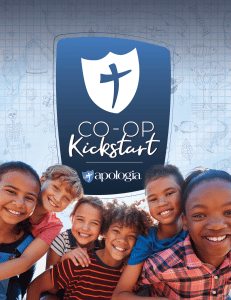
Don’t Homeschool Alone: Finding the Right Homeschool Community
You have your curriculum picked out, you are working on planning, you’re feeling somewhat confident about your decision, and then the question comes…have you found a homeschool community or group?
Wait… what? You may ask yourself, “I have to find a homeschool group?” And then, a new round of research ensues, and you’re faced with a list of different types of groups, and the overwhelming feeling starts again.
No worries, we have you covered! Let’s take a look at the different types of homeschool groups out there, and hopefully, we can help guide you to find the right homeschool community for your family.
Homeschool Co-Ops
Homeschool co-ops are groups of families who work together (cooperatively) to achieve common goals. These co-ops can be organized around crafts, service work, academics, social time, projects, or a combination of different areas.
Co-op activities and classes are often led by parents, or if there are paid teachers or activity leaders, those individuals are paid by the parents. Co-op sizes can range in size from a couple of families to a few hundred families.
Homeschool co-ops may meet in libraries, homes, community centers, or churches. These groups vary greatly in their meeting frequency, and their yearly calendar is determined by the co-op leaders.
Is a Homeschool Co-op the Right Homeschool Community for Me?
Homeschool co-ops are a great choice if you are looking to add a little more structure to your homeschool. They offer great socialization opportunities for the kids (and mom) and classroom experiences that you can’t replicate at home. When considering a homeschool co-op, make sure the homeschool co-op you are considering is close to home, is at a convenient time for your family, and fits the needs of your children. When considering a co-op, ask yourself what the time commitment is. Look at the classes offered, and ask if your children will be interested in them. See if you can shadow the co-op for a day before committing, talk to some of the moms at the co-op and ask what they like and don’t like about the homeschool co-op. Homeschool co-ops are oftentimes going to be lower cost than many of the other homeschool group options below, which can be a big benefit for larger families. They will also typically require more work from the mom as well as most co-ops do ask for parents to volunteer in some capacity. Homeschool co-ops are usually a break off from a larger homeschool group, so they will also include enrichments like field trips, proms, and other socialization opportunities.
 Download Apologia’s FREE Co-op Kickstart Guide
Download Apologia’s FREE Co-op Kickstart Guide
Apologia’s Co-op Kickstart Guide is designed with you in mind. There are many creative ways to teach an Apologia course in a co-op setting, giving you the flexibility to adjust the course to fit your teaching style. And while we list some options within this guide for your consideration, know that we fully encourage your customizing Apologia courses to reflect your needs. We hope that you find the materials in this guide helpful in getting started.
Homeschool Tutorials
Tutorials are quite different from a homeschool co-op in that they are a hybrid between a co-op and a school. This option allows students to be dropped off and does not have a parental involvement requirement like most homeschool co-ops. Tutorials typically offer more structured classes for multiple full days each week. However, they are not a full school, meaning they do not have to follow all of the legal requirements that public schools do. There is often a higher expense because of the need for a more permanent space, insurance needs, paid staff, and supplies. However, tutorials are still often less expensive than private schools or private tutors. With tutorials, the class time is typically focused on one or two subjects, like science, language, etc.
Is a Homeschool Tutorial the Right Homeschool Community for Me?
Tutorials are a great option for parents who want to be able to drop their kids off and have little involvement. This works well for parents with lots of younger children at home, parents who work from home, or outside of the home, or who have other commitments. This also works well for those subjects that a parent may not feel comfortable teaching. For many parents, this may be a lab, foreign language, or upper-level math. This is also a great option for parents who want their children to have the social classroom experience.
If a parent is wanting a full-on school, with all the curriculum and grading done for them, this is not the best option. It is also not the best option if a parent is wanting lots of socialization opportunities, as a tutorial is most often just academics.
Hybrid Schools
Hybrid homeschooling is a mix of homeschooling and classroom time. There are so many different ways to define hybrid homeschooling, and it is a relatively new tendency in education. How hybrid homeschooling looks will depend on what your school or homeschool group may offer.
With a hybrid homeschool, your student will go to school a few days a week and then do schoolwork at home the other days (much like the tutorial option above). The difference with this option is that your child is also enrolled in a school. The teachers will be providing the grades, oftentimes choosing the curriculum (for the courses they are enrolled in) and overseeing the bulk of the education. With this method of homeschooling, students mix traditional school attendance with home instruction. Parents are still greatly involved in their children’s education, but this is a more traditional approach to school than many of the other groups listed here.
Is a Hybrid Homeschool the Right Homeschool Community for Me?
The hybrid homeschool option offers benefits such as a break from homeschooling a few days a week, the stress of curriculum planning, grading, etc. Your children will experience socialization in a classroom setting, and in some states, your homeschool expenses can be deducted through educational savings accounts or other state-funded programs. With the benefits, however, you may lose some control and freedom over your school year and academic choices. Another factor to consider is that the cost is usually higher than some of the options listed above.
Homeschool Pods or Microschools
Homeschool pods (sometimes called microschools) are meant to mimic a school classroom but for a small group of students. These pods allow for the social aspect of a classroom on a smaller scale. They oftentimes are made up of just a couple of like-minded families, neighbors, or relatives. These pods are sometimes called one-room schoolhouses reimagined. The class sizes are usually smaller than 15 students and consist of all ages. The schedules and curriculum are tailored to fit the needs of all. These pods are run mostly by parents but occasionally are started by an independent teacher.
Is a Homeschool Pod Right the Homeschool Community for Me?
Homeschool pods are great if you have a few friends who are like-minded that you want to homeschool with using the same curriculum and resources. Homeschool pods may not be a good fit if you think that you may want to stray from the same curriculum, schedule, etc, that everyone else in your pod may be using.
Enrichment Homeschool Group
Homeschool enrichment groups tend to be larger and more general-purpose than co-ops or hybrids or anything else on this list. These groups plan field trips, art classes, park days, book clubs, parties, proms, etc. Most of the time, co-ops, hybrids, pods, etc, have originated from a homeschool group.
Is an Enrichment Homeschool Group the Right Homeschool Community for Me?
Do you want socialization opportunities without the commitment and classroom aspect? If so, then an enrichment homeschool group is probably the right fit for you.
An enrichment group will require little to no commitment and will allow you to pick and choose which activities you want to attend. Sometimes these groups will still have a small membership fee to cover things like an email list, food for get-togethers, shelter rentals, etc. But overall, the commitment and fees are minimal. The number of opportunities with an enrichment group is not always guaranteed because they are organized by volunteers. The amount of active participation will determine the number of opportunities. If you join a large group with many active volunteers, you may find yourself needing to say no to too many enrichment opportunities.
Finding a homeschool community can offer support during times when you may feel alone on your homeschool journey. Homeschool groups give children and parents the opportunity to interact socially and fellowship with like-minded people. They give families the incredible opportunity to come alongside each other and live life together while educating their kids at home.
Online Homeschool Support Groups
Online homeschool support groups allow parents to connect with other homeschoolers using social networking tools, online forums, or other means of communications. Parents can reach out to other homeschoolers nationwide for support regarding homeschool concerns, special needs, high school questions, curriculum suggestions and concerns, or practical tips for homeschooling. Online support groups also allow homeschoolers to stay up to date on local and state homeschool legislative issues. There are many different types of online homeschool support groups. Most are specific and will be targeted towards areas such as curriculum, state or local area, special needs, high school, etc.
Is an Online Homeschool Support Group the Right Homeschool Community for Me?
An online homeschool support group is really a great fit for most parents. It provides support to those who may not have support in person. It also expands support to more specialized areas, such as special needs, statewide and national concerns, as well as curriculum-specific questions.
Join Apologia’s Online Support Group!
The purpose of the Facebook group, Learning with Apologia Curriculum is to support and encourage one another through the sharing of ideas and photos, along with answering questions about homeschooling and Apologia curriculum products.
Hear What Has Worked for Other Homeschool Moms
4 Homeschool Moms Answer Your Top Homeschool Questions
Hear from 4 Moms on a Mission where we ask four homeschool moms some of your top questions. You’ll hear different perspectives from each mom as they share practical advice, tips, and what has worked for them in their own homes.











